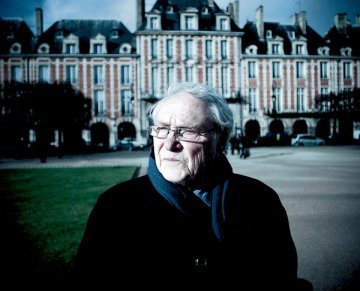A Poet Who Moves to the City’s Beat

Jacques Réda at Place des Vosges in Paris (photo via Irish Times)
[Jacques] Réda has lived in Paris since 1953, and his chronicling of the city’s landscape is one of the recurring features of his work. The French term flâneur is often applied to him, though he prefers circulation . After all, “the real flâneur is someone who has their head in the clouds, who stops everywhere, who has no objective. That’s not really my temperament,” he says. And yet Réda seems forever on the move: setting off, stopping, beginning afresh. His gaze is constantly being drawn, whether by a beautiful 19th century building, an elegant shopfront, or, as in his prose-poem The Ruins of Paris , “by a sky as incomprehensible as the approach of love”. As Jennie Feldman, a translator of his poetry, has noted, the realistic tone of Réda’s work has been credited with helping to “ground” tendencies to lyrical flightiness, and in contrast to the abstract form of expression found in much modern French poetry, there is a sharp visual instinct at work. He has said that many of his poems originated in a single stubborn image of something seen or imagined: a woman selling wool, a reflection in a puddle, a beggar on a street corner.
Réda’s vantage point is often that of a face lost in the crowd, marvelling at the ordinary or the nondescript – bottles lying in the gullies, “singing colossi of roses” or “olive trees in grand conversation/calmly smoking in the sun” – as the world barges past.
“I was never as happy as I was when I wandered slowly on the backroads of the French countryside,” he remarks. And yet the urban street has so often been his muse. “A crowd is a collection of individuals, and each individual is an atom of that crowd,” he says. “I don’t enjoy crowds that come together out of necessity, like on public transport at rush hour . . . but I don’t dislike wandering around in a crowd that has merely this wandering around as its purpose, for example during the summer, on the banks of the Seine, or a Sunday on Grafton Street.”
Read the full article at Irish Times…
Related articles
- Mindfulness and Flânerie (virtualdavis.wordpress.com)



[…] A poet who moves to the city’s beat […]
[…] A poet who moves to the city’s beat […]